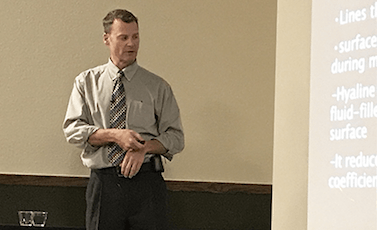Dr. Michael Repine on Treating Knee Arthritis
- Category: General, Orthopedics, Surgery
- Posted On:
- Written By: Boulder Community Health


By the time we’re 50, our knees have carried us more than 75,000 miles. Most of us don’t give our knees a second thought—until degenerative arthritis takes its painful toll and limits our day-to-day activities.
Degenerative knee arthritis (osteoarthritis) occurs when the knee joint’s cartilage — a smooth, slippery substance that lines the ends of bones — wears away.
“Healthy, normal cartilage allows the ends of bones to roll and slide easily against each other during motion. But too much wear on the cartilage’s surface leads to its deterioration, similar to how tread on the tires of a car wears down over time,” orthopedic surgeon Michael Repine, MD, of Boulder Medical Center explained during a free health lecture held on Aug. 27 at the Lionsgate Event Center in Lafayette.
“Osteoarthritis of the knee is this mechanical wearing down of the cartilage surface. When the cartilage is thinned or absent, problems such as pain, swelling, instability and limited motion occur,” Dr. Repine said.
Symptoms
Dr. Repine said the symptoms of knee osteoarthritis can include:
PAIN
- During weight-bearing activities
- While sleeping at night
- Located across entire knee or focally to an area
- Usually slow in onset, with a gradual increase
INFLAMMATION
- Warmth in the joint
- Swelling or stiffness, which can be more pronounced after a period of inactivity
LIMITED MOTION, GRINDING AND POPPING
- Loss of flexibility or restricted range of motion in the joint
- Overall weakness, causing the knee to give way or buckle
- Creaking, crackly or popping sounds during movement
Non-Surgical Treatment Options for Knee Arthritis
According to Dr. Repine, physical therapy is almost always the first step in treatment, with the goal of reducing pain and improving range of motion and strength. He also described other non-surgical treatments and the pros and cons of each:
Nonsteroidal anti-inflammatory drugs (NSAIDs)
- Pros: Decreases inflammation and pain.
- Cons: When used long term, there is a risk of gastrointestinal bleeding.
Nutritional supplements
- Pros: Many sufferers find nutritional supplements helpful such as glucosamine and chondroitin.
- Cons: Too many of these products don’t measure up to their claims and data on proven effectiveness is somewhat inconsistent. None have passed FDA testing to prove effectiveness.
“Since there are thousands of supplements on the market, conduct your own personal trial study. Take a supplement for awhile to see if it works or not," said Dr. Repine.
Cortisone injection
- Pros: Relatively well-tolerated procedure that offers very predictable reduction in pain. It often “buys time” for patients whose joint isn’t quite ready for total replacement.
- Cons: The injection must be placed carefully and can soften the cartilage with repetitive use. Also, it tends to mask symptoms.
Viscosupplement injection (hyaluronic acid)
- Pros: Protects any remaining cartilage and helps improve the biochemical environment of the joint, offering reliable reduction in pain.
- Cons: None with appropriate patient selection. However, there’s a small potential for a reaction with repetitive administration.
Stem cell therapy
- Pros: Anecdotal reports appear promising when osteoarthritis is caught early.
- Cons: It's expensive and uses are still being heavily researched.
Surgical Treatment Options
Still, even after taking these steps, many people with knee osteoarthritis look to surgery as a way to get relief from bone-on-bone pain and resume the physical activities they love.
Arthritis located in a well-defined area is most often treated arthroscopically. Sometimes cartilage transplantation or resurfacing can also be an option.
“For these surgical treatments to be effective, we must catch the damage early on, before any secondary bone changes occur,” according to Dr. Repine.
More advanced arthritis often requires more advanced surgical options, including Mako robotic-arm assisted surgery for partial knee resurfacing and total knee replacement.
However, Dr. Repine warned that you shouldn't wait too long to consider surgery because "you can miss the boat for certain procedures.”
He then went on to explain how BCH's computer-assisted Mako technology uses a state-of-the-art robotic arm with computer-guided mapping software. Mako syncs a patient’s preoperative CT scan data to intraoperative data, providing each patient with a personalized surgical plan based on their unique anatomy. This allows for the highly accurate placement and alignment of a knee implant.
BCH’s Foothills Hospital was the first facility in Colorado to offer Mako total knee replacement.
“It is a real game changer,” Dr. Repine said, “Mako Total Knee Replacement is the latest and greatest for total knee replacement. It can offer the potential for a shorter recovery time and more natural feeling knee for knee replacement patients.”
If you suffer from symptoms of knee osteoarthritis, schedule an appointment with Michael Repine, MD, by calling 303-440-3036.
Click here to view PowerPoint slides from Dr. Repine’s lecture on “Relieving Arthritis Knee Pain.”
Want to receive notification of special events and lectures? Sign up to receive email notifications.